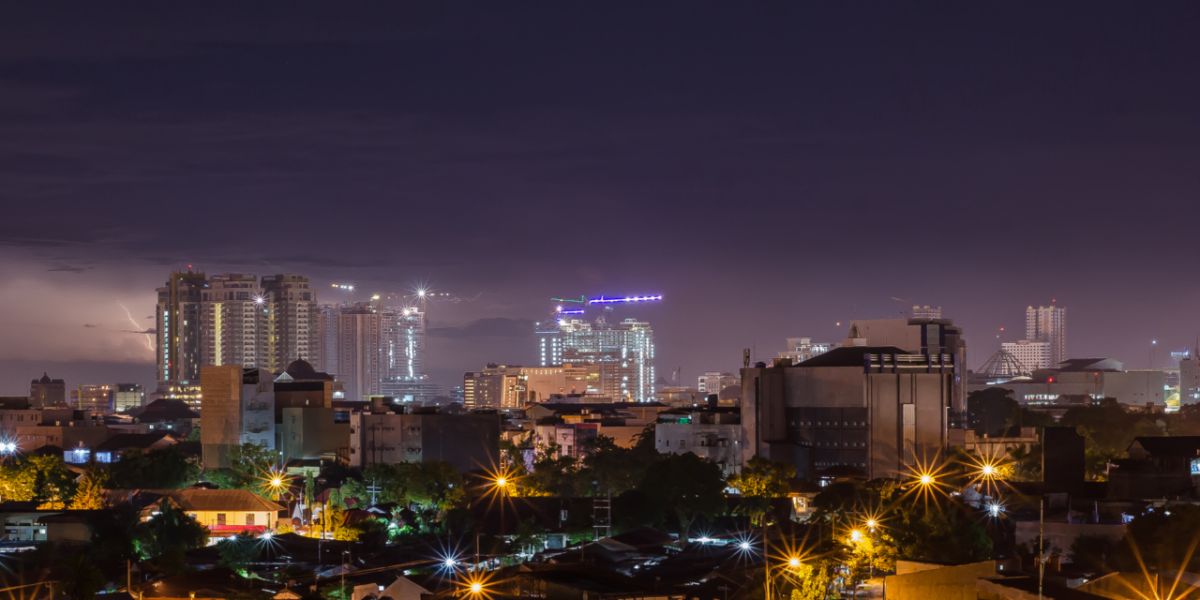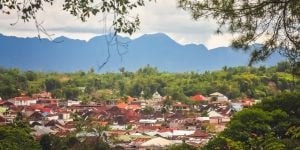
It is Indonesia's third largest city and is often considered by tourists as a stopover before taking off for more exciting destinations on the island of Sumatra, like Lake Toba (the world's largest volcanic lake) or the wild Sumatran jungle, where orangutans can be observed. Medan is home to some places where tropical beauty thrives in the form of lush forests, waterfalls, mountains and lakes. On the other hand, it is also bustling with signs of civilization where shopping malls, restaurants, and many other modern amenities are popping up! In fact, Medan is mainly known as the gastronomic capital of the Indonesian archipelago, and while the city abounds in excellent places to eat, its streets are full of spicy delicacies.
Such notoriety is namely due to its ethnic diversity, which can be sensed in its flavory mix of Minangkabau, Batak, Sundanese and Chinese cuisines. This is why the city is considered one of Southeast Asia's greatest gastronomic getaways.
Medan is a multi-cultural city that has grown rapidly over the past two decades. As a city of contrasts, Medan is a mix of chic cafes and bars, rundown colonial buildings, and food stalls. This city is undoubtedly much more than just a gateway.
Because of its charm and opportunities, Medan is home to many of the approximately 350,000 expatriates who reside in Indonesia. In addition to the beauty of the surrounding jungles and its quality as an exceptional gastronomic destination, the capital of North Sumatra is nowadays considered an important economic hub, not only in Indonesia but also in the Southeast Asian region. As a result, it is one of the most popular cities for foreign entrepreneurs in Indonesia, who are drawn by the numerous financial opportunities it offers.
As such, the job market is booming there, with many opportunities for expatriates who have strong professional skills and international experience.
How to write your CV in Medan
If you are looking for a job in Medan, make sure that your CV is up to date, that it highlights your main assets, and above all that it is adapted to Indonesian standards. Indeed, as anywhere else in the world, CVs in Indonesia must be presented in a strict format in order to be acceptable to potential recruiters. Most of the time, résumés that are not up to the local standards end up directly in the trash.
In Indonesia, a Curriculum Vitae:
- Must be only one page long
- Must include a formal but attractive photo of yourself
- Be concise and provide personal information only if necessary
- Summarize your key strengths
- List your general skills
- Contain your contact information and link to your LinkedIn profile.
While a LinkedIn profile may not seem mandatory to you, be aware that this social network is used by most HR professionals in Indonesia. Its popularity is such that almost all recruitments are nowadays made through it. Therefore, make sure that your LinkedIn profile is up to date, complete, and that it highlights your professional attributes.
As far as personal information is concerned, avoid going overboard and disclosing everything about your life. Mentioning that you are married and have children should be more than enough. If you are involved with a charity, you should mention this as well, but there's no need to give details about your medals from intercollegiate games or the number of siblings you have.
If you have previously worked for a prominent company, try to highlight this information and explain how this experience has helped you gain more knowledge in your field of expertise. Finally, try to keep it simple and don't use bright colors for your resume paper, as this may be considered a sign of superficial vanity in Indonesia.
Medan's labor market
Thanks, in part, to its proximity to Singapore, Medan is a booming economic hub and the region's commercial crossroads. The city is primarily known for its palm oil production, with nearly 4 million hectares of palm plantations on the island of Sumatra. The region is also renowned for its cocoa, rubber and tea.
The province is fertile and rich in raw materials and thus has a strong agricultural sector. For example, PP London Sumatra has more than 116,000 hectares of plantations, which can be seen from the areas surrounding the new airport in the Delhi Serdang area.
While there are more job opportunities for expatriates in Medan than elsewhere in Indonesia, they are still rather limited due to the government's commitment to protecting local employment. Indonesian law, indeed, dictates that a company must justify the hiring of a foreigner over a local citizen. Therefore, you are more likely to be hired quickly if you work in one of the sectors where foreign expertise is sought. But, following the COVID-19 crisis in
Indonesia, the authorities are gradually opening up the local economy to foreign investment, which should indirectly increase the chances of employment for expatriates throughout the archipelago.
Job opportunities in Medan
Because of its geographical location, Medan has benefited greatly from the multi-billion dollar palm oil trade. Despite being controversial, palm oil is currently still in half of the world's supermarkets, which means there are many opportunities in the industry.
However, the sector has been slowing down for some time, with the Indonesian government deciding to ban palm oil exports in April 2022. The authorities aimed to better control the price of oil sold domestically following a surge in costs and a wave of protests by the population. The decision had a significant impact on international food prices, as palm oil is used in a wide range of food products. Exports resumed as normal on May 23, 2022, and the sector is expected to recover quickly.
The populated part of Medan has more than doubled in size, adding about 2.5 million people over the past two decades. If you live there, you may have to be patient with the traffic jams. Parallelly, condos, hotels and theme parks have sprung up all over the place to support this influx, and development has certainly taken precedence over environmental conservation. With this, ecological concerns about deforestation have been on the rise, and it is hoped that there will be more jobs in the green sector and ecotourism as international pressure intensifies.
English teaching jobs are also available in the city. There are 13 universities in the city and teaching as well as lecturing positions can be filled by expatriates with skills and experience in international academic educational institutions. The average salary for a teacher in Medan is around IDR 6 million per month.
The other promising business sector in Medan is real estate. As we have already explained, the city is experiencing a steady development, and several international agencies have set up shop here. Whether it is in construction or real estate sales, there are many opportunities in this booming economic sector.
The ICT sector has also witnessed a tremendous boost in Medan in recent years. Many startups have launched in the city with the goal of offering various innovative digital solutions. In the same vein, many digital nomads in Indonesia have chosen to relocate to Medan. As a matter of fact, it is always possible to find good management positions in ICT companies or to offer programming services as a freelancer or as an employee of an IT company.
Tourism is also an important source of employment in Medan. With the thriving nature around the city being a major tourist attraction, there are plenty of opportunities in this sector, especially in the hotel industry. Moreover, Medan has several high-class hotels, such as Prime Plaza Hotel Kualanamu, Emerald Garden International Hotel, JW Marriott and Four Points by Sheraton Medan. The websites of these hotels regularly publish job postings, so it may be worth visiting them from time to time if you are a hospitality professional.
The health and medical field generally offer interesting opportunities for health professionals in Medan. However, you should be aware that with Indonesia's poor health care system, salaries are much better in the private sector. That is why almost all expatriate doctors and other foreign healthcare professionals in Indonesia are either self-employed or work for private clinics and healthcare facilities. If you have enough qualifications and good experience, you should find a job in no time, especially if you are specialized in particular medical fields such as surgery, orthodontics, and cardiology, amongst others. There is indeed a high demand for these types of professionals due to the lack of medical expertise in Indonesia.
Medan is a major regional trade hub where import-export is another major source of employment for expatriates. Most professionals in this sector work for big international companies, ranging from shipping companies to logistics and transportation companies to the food processing industry. Again, local companies prefer expatriates with attractive résumés and a good chunk of experience, mainly for managerial positions.
If Medan has won your heart, then you should have no trouble finding a job there, provided you have all the necessary qualifications.
How to find a job in Medan?
If you work for an international company that has offices in Medan, why not apply for an internal transfer? This would be the easiest way to live and work in the city. Many expatriates in Indonesia have been transferred there or got hired before moving there.
One of the best ways to get a job fast in Medan is to use job search websites. The most popular and widely used job boards in Medan are Glassdoor, go-work, jobs.goabroad.com, Upwork and jobs.citi. Feel free to browse through several of them to increase your chances of finding a position that suits you while specifying your salary expectations and your area of residence.
In the city, attend networking events to meet other professionals and seek advice.
Networking in Indonesia is indeed a very effective way to find a job quickly. Don't forget to keep a stock of business cards with you and share them systematically with your new contacts. Remember to present your cards with your right hand; the left hand is considered impure in Indonesia.
Above all, be aware that if you are not respectful of networking etiquette in Indonesia, you may severely damage your chances of employment in the city. News travels fast in Indonesian business circles, and anyone caught repeatedly breaking local codes is systematically singled out. Finally, don't forget. Internet is your friend, so browse through websites and forums to see what jobs are available online.
Useful links:
We do our best to provide accurate and up to date information. However, if you have noticed any inaccuracies in this article, please let us know in the comments section below.








